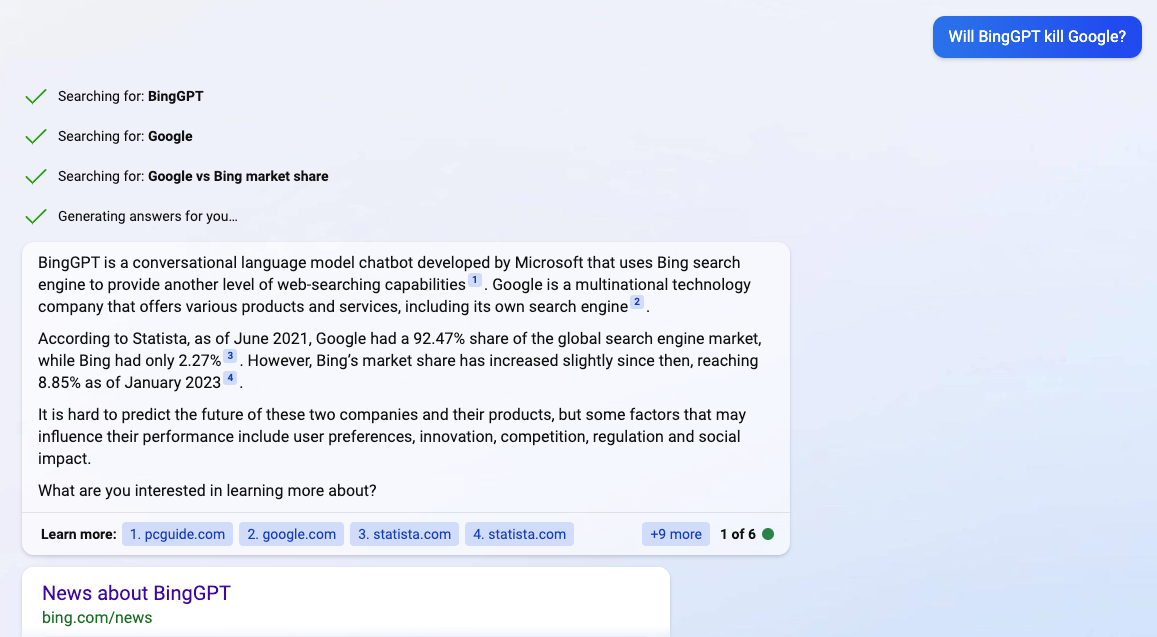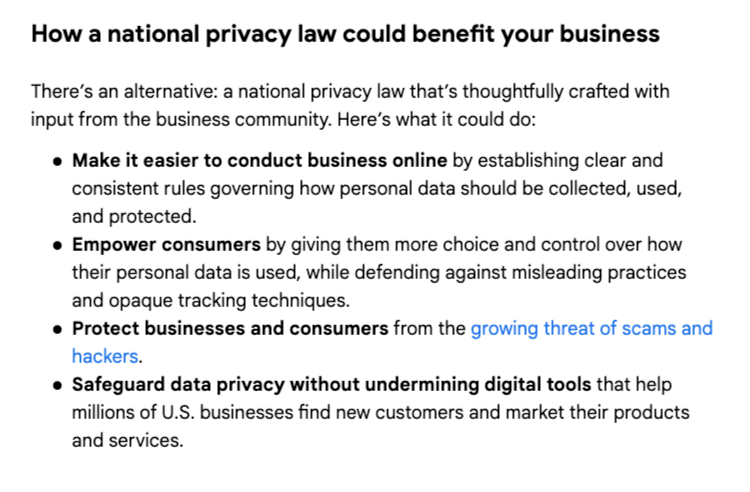GPT Won't Kill G, Assistants 2.0, National Data Privacy

BingGPT Not a 'Google Killer'
You've seen the conjecture that ChatGPT will render Google obsolete within two years. After finally gaining access and testing out BingGPT, I'm confident that prediction is wrong. Yes, Google is at risk of losing some market share and a modified SERP could impact revenues. But BingGPT is not a "Google killer" – at least in its current form. Nonetheless, we welcome Microsoft's effort to shake up search and do something innovative. BingGPT's blending of search and chat is both elegant and awkward. I find the chat UI less fatiguing than the traditional SERP; it's simpler and more direct. But it's not necessarily better. For example, local results just appear to be Bing results presented in a truncated form. And often, you can't get a local chat result unless you specifically move to the chat UI. Yet the ability to refine results "conversationally" is useful (only up to "5 turns"). I'm also confident new search behaviors will start to emerge.

Our take:
- BingGPT may gain a few points. But Google usage is habitual. However, we're still in the infancy of GPT-style assistants.
- AI chat integration into vertical sites (e.g., travel or shopping) could deliver a better UX than searchOG. That could have an impact.
- But the possibility of alternatives is itself potentially disruptive. BingGPT, Neeva and others whet our collective appetites for new search UXs.
Can AI Revive Voice Assistants?
There are lots of theories about what went wrong with virtual assistants. One holds that closed ecosystems, grandiose claims and cheap capital stunted their development. Regardless, it's clear that Siri, Alexa and Google Assistant mostly failed to live up to their early promise. Alexa lost billions for Amazon; the company wound up laying off numerous Alexa-related employees and scaling back its virtual assistant ambitions. Apple has made only incremental improvements to Siri since its 2010 acquisition. And Google seems to be ambivalent about its own assistant, probably because of the threat to ad revenue. But ChatGPT and AI may represent a second bite at the apple, so to speak. Voice assistants never became truly conversational; they're voice command input systems that yield isolated responses or actions. You can't follow up, go deeper or have a conversation. ChatGPT offers the potential to change that and make voice assistants truly conversational. But will it happen?

Our take:
- The technology now exists to make Siri or Alexa fully conversational and, in some cases, a potential alternative to traditional search.
- It may never come to pass because the public appears to have moved on to some degree and there's been a monetization challenge.
- The story of voice assistants is a reminder of how "disruptive" technologies often don't turn out to be as disruptive as people think.
National Privacy Legislation Back On?
Congress is reportedly re-taking up long-overdue national privacy legislation. The American Data Privacy and Protection Act (ADPPA) was close to passage in 2022, but stalled over state-law preemption and enforcement terms. Today, five(ish) states have digital or data privacy laws, with roughly 15 others under consideration. They all have somewhat different terms and requirements. Some are more consumer-friendly (i.e., California's), and some are more business friendly (read: weak), like Virginia's. ADPPA is considered weaker than California's law but still meaningful. However, the challenge of complying with a growing patchwork of state privacy rules is a major headache big tech companies understandably want to avoid. What they would prefer is a single, weaker privacy law that preempts stronger state rules. California is the current national de facto privacy regulator. And the state opposes any national pre-emption that might come with passage of the ADPPA or equivalent. Meanwhile, Google, Meta and others are lobbying in favor of a national law.

Our take:
- Big tech companies are vocally advocating in favor of a national privacy law. That appears to be the right thing to do. Appearances can deceive.
- Their arguments are logical and sensible. We do need a national privacy law. The problem is most tech companies want the weaker version.
- All data collection and sharing should be simple and opt-in, rather than opt-out. Even California's law is opt-out. Anything less is status quo.
Recent Analysis
- Fake Review Attacks Increase on Google Business Profiles, transcript.
- Near Memo ep. 102: Adding services helps local rankings, title tags and ranking, impact of Google easing review filter to placate Local Guides.
Short Takes
- Deal will bring Google Maps and YouTube into Mercedes cars.
- Manually added GBP products now showing up in Shopping tab.
- Snap builds "My AI" on ChatGPT, available with Snapchat+.
- Nextdoor Q4 beats expectations; company has 40M weekly users.
- A $10,000 Nvidia chip is the brain behind AI's brain.
- Google Ads: new features/tools say hi, others say goodbye.
- Walmart’s store-fulfilled deliveries more than $1 billion a month.
- TikTok "sounds for business" to help SMBs create better content.
- Apple quietly implements "clean energy charging" for iPhones.
- Bluesky: If Twitter and Mastodon got together and had a baby.
- Meta's mixed-reality hardware business includes ads of course.
- Is "boring" Steve Davis on deck to become Twitter's new CEO?
- TikTok AI face filter is both amazing and depressing-scary.
Listen to our latest podcast.

How can we make this better? Email us with suggestions and recommendations.

